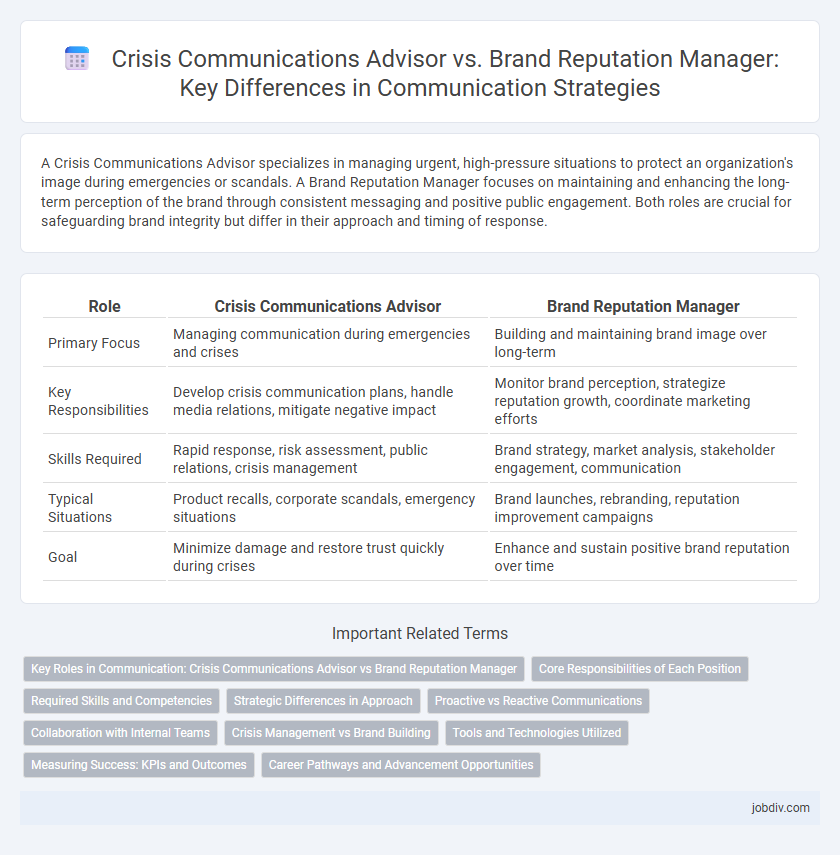A Crisis Communications Advisor specializes in managing urgent, high-pressure situations to protect an organization's image during emergencies or scandals. A Brand Reputation Manager focuses on maintaining and enhancing the long-term perception of the brand through consistent messaging and positive public engagement. Both roles are crucial for safeguarding brand integrity but differ in their approach and timing of response.
Table of Comparison
| Role | Crisis Communications Advisor | Brand Reputation Manager |
|---|---|---|
| Primary Focus | Managing communication during emergencies and crises | Building and maintaining brand image over long-term |
| Key Responsibilities | Develop crisis communication plans, handle media relations, mitigate negative impact | Monitor brand perception, strategize reputation growth, coordinate marketing efforts |
| Skills Required | Rapid response, risk assessment, public relations, crisis management | Brand strategy, market analysis, stakeholder engagement, communication |
| Typical Situations | Product recalls, corporate scandals, emergency situations | Brand launches, rebranding, reputation improvement campaigns |
| Goal | Minimize damage and restore trust quickly during crises | Enhance and sustain positive brand reputation over time |
Key Roles in Communication: Crisis Communications Advisor vs Brand Reputation Manager
A Crisis Communications Advisor specializes in managing urgent communication during incidents that threaten an organization's stability, focusing on rapid response, message accuracy, and stakeholder reassurance. A Brand Reputation Manager oversees long-term strategies to build and maintain a positive public image, emphasizing brand consistency, audience engagement, and reputation monitoring. Both roles require strategic communication skills but differ in scope, with the former addressing immediate crises and the latter managing ongoing brand perception.
Core Responsibilities of Each Position
Crisis Communications Advisors specialize in managing urgent information flow during emergencies, controlling message consistency, and mitigating negative impacts to protect organizational trust. Brand Reputation Managers focus on maintaining and enhancing the overall public perception by crafting long-term communication strategies, monitoring social sentiment, and aligning brand values with stakeholder expectations. Both roles require strategic messaging but differ as crisis advisors address immediate threats, while reputation managers build sustained brand equity.
Required Skills and Competencies
A Crisis Communications Advisor excels in rapid response, risk assessment, and media relations to manage urgent reputational threats, requiring skills in strategic communication, crisis management, and stakeholder engagement. A Brand Reputation Manager focuses on long-term brand equity, requiring competencies in brand strategy, consumer insights, and digital reputation monitoring to maintain and enhance public perception. Both roles demand strong communication skills, emotional intelligence, and the ability to influence multiple audiences effectively.
Strategic Differences in Approach
Crisis Communications Advisors prioritize rapid response and damage control to protect an organization's immediate credibility during emergencies, focusing on transparent stakeholder communication and mitigating misinformation. Brand Reputation Managers adopt a proactive, long-term strategy by cultivating brand identity and trust, emphasizing consistent messaging and reputation building across multiple channels. The strategic difference lies in Crisis Communications Advisors addressing urgent threats, while Brand Reputation Managers shape ongoing public perception and loyalty.
Proactive vs Reactive Communications
A Crisis Communications Advisor specializes in reactive communications, swiftly managing and mitigating negative situations to protect an organization's reputation during emergencies. In contrast, a Brand Reputation Manager focuses on proactive communications, building and maintaining a positive brand image through strategic messaging and long-term reputation management. Together, their roles balance immediate response with sustained brand value in dynamic communication landscapes.
Collaboration with Internal Teams
Crisis Communications Advisors collaborate closely with internal legal, executive, and public relations teams to coordinate rapid response strategies that minimize damage during emergencies. Brand Reputation Managers work alongside marketing, sales, and customer service departments to ensure consistent messaging and uphold the company's image over time. Effective collaboration between these roles integrates real-time crisis management with long-term brand reputation goals, fostering organizational resilience.
Crisis Management vs Brand Building
A Crisis Communications Advisor specializes in rapid response strategies to mitigate negative impacts during emergencies, focusing on controlling narratives and protecting stakeholder trust. In contrast, a Brand Reputation Manager drives long-term brand equity through consistent messaging, customer engagement, and proactive reputation enhancement. Effective crisis management preserves brand integrity, while brand building ensures sustained competitive advantage and market positioning.
Tools and Technologies Utilized
Crisis Communications Advisors rely heavily on real-time monitoring tools such as social media analytics platforms, media scanning software, and rapid response communication systems to manage and mitigate emerging issues swiftly. Brand Reputation Managers utilize comprehensive brand tracking technologies, sentiment analysis software, and customer relationship management (CRM) systems to maintain long-term brand value and public perception. Both roles integrate digital communication platforms and data analytics, but Crisis Communications Advisors prioritize immediate alert and response capabilities, while Brand Reputation Managers focus on strategic analytics for sustained reputation building.
Measuring Success: KPIs and Outcomes
Crisis Communications Advisors evaluate success through KPIs such as response time, message reach, sentiment analysis, and issue resolution speed to minimize reputational damage during emergencies. Brand Reputation Managers track metrics like brand sentiment scores, customer loyalty indices, and long-term media coverage quality to measure sustained perception and trust. Both roles rely on real-time analytics and stakeholder feedback to align communication strategies with organizational goals and crisis contexts.
Career Pathways and Advancement Opportunities
A Crisis Communications Advisor specializes in managing urgent issues and mitigating negative impacts during high-pressure situations, often advancing towards senior roles in risk management or corporate communications. A Brand Reputation Manager focuses on long-term brand perception and strategic initiatives to build brand equity, typically progressing to leadership positions in marketing or public relations departments. Both career pathways offer opportunities for growth in leadership, with Crisis Communications Advisors often moving into crisis consultancy and Brand Reputation Managers advancing into executive brand strategy roles.
Crisis Communications Advisor vs Brand Reputation Manager Infographic

 jobdiv.com
jobdiv.com